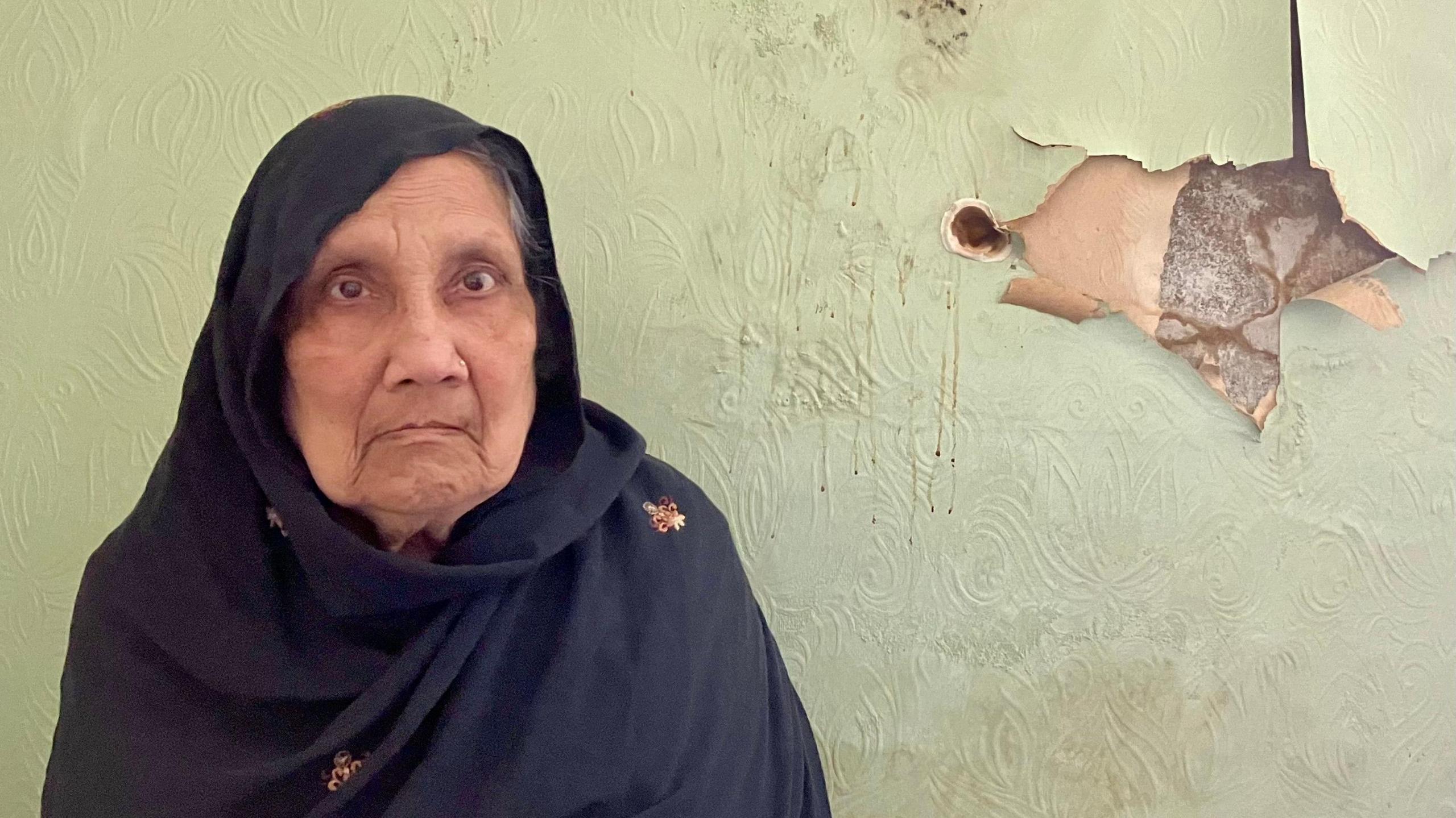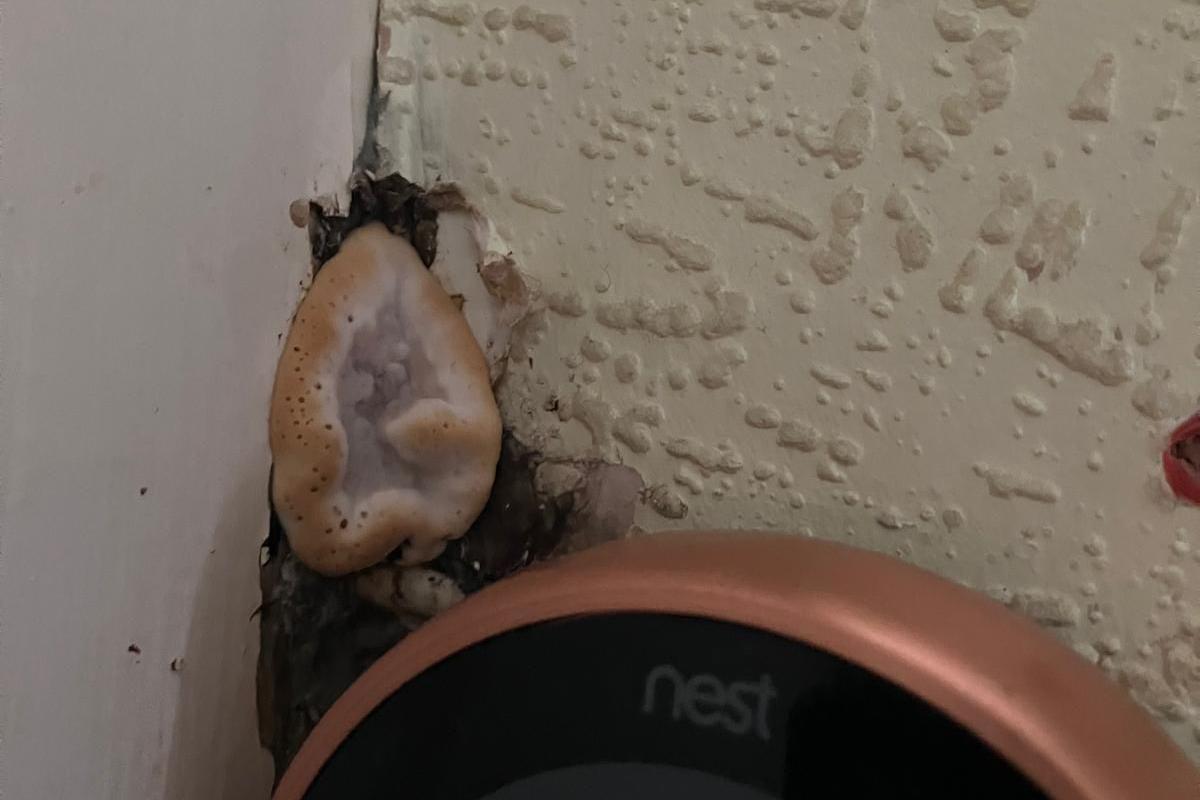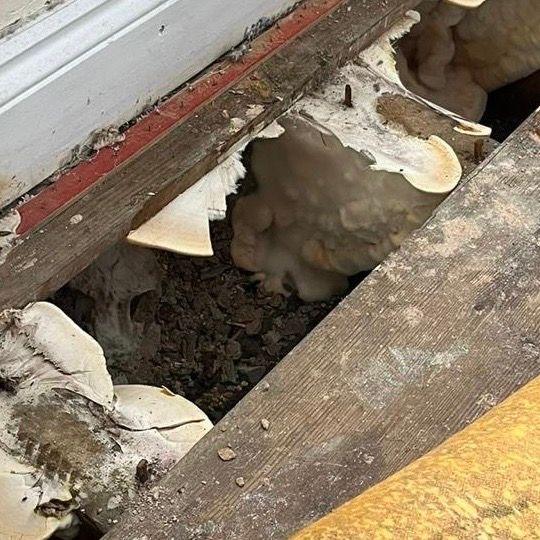'Botched insulation means mushrooms grow on my walls'

Tormuja Khatun had her house insulated less than two years ago - the problems are clearly visible
- Published
Tormuja Khatun’s house in Luton is being consumed by black mould, mushrooms and dry rot after the botched installation of external wall insulation.
Her family say they have been warned it could cost more than £100,000 to repair, and describe the situation as a "nightmare".
Mrs Khatun’s case is far from unique. A growing number of MPs are worried about the impact on their constituents of poorly installed insulation, while Citizens Advice is calling on the government to "urgently fix" regulation of the sector.
The government urged anyone with concerns about their insulation to engage with Trustmark, whom companies who carry out work under government schemes must be registered with.
Mrs Khatun is 84 and recently had a stroke. Not far from where she sits, large growths of dry rot fungus are feeding off the floorboards.
"Worry, worry,’’ she says as she points to the black mould that is growing on her sitting room wall.
In November 2022, Mrs Khatun had her house insulated under a government scheme known as ECO 4. It is designed to help low-income households make their homes warmer and cut their energy bills. Insulation boards are fixed to the exterior brickwork of a house and then coated in render.
More than three million homes in the UK have had insulation fitted under government ECO schemes, which are paid for by the energy companies, with the cost passed on to all consumers through their energy bills.
The BBC revealed earlier this year that hundreds of thousands of these homes could have insulation that wasn’t installed to the required standard.
Within months of Mrs Khatun getting her insulation fitted, it became clear that this was the case in her house. A surveyor’s report shows how rainwater penetrated the house leading to the damp, mould and dry rot.
Mrs Khatun’s son, Lukman Ashraf, says he doesn’t feel like there’s any guarantee the companies involved will cover the costs of repairs.
"We’ve been dealing with this for nearly a year whilst the situation has been getting progressively worse and the repair costs are going up.
"We just want to wake up from this nightmare and get our lives back."

Mushrooms are growing on the walls inside the house
He gives me a tour of the house. As we move from room to room, he cuts mushrooms off the walls.
He breaks down when he thinks about how hard his father worked at the Vauxhall car factory to be able to buy the house in 1990.
"They were passionate about having their own house. And seeing it go downhill, because someone's done a really, really, bad job - it's just really shocking.’’
More than 3,000 homes in Luton have had external wall insulation fitted and growing numbers of residents are contacting the council for help.
Its deputy chief executive, Mark Fowler, says he is ‘‘very worried’’ and wants to know why there isn’t more regulation.
"I think the government and the people they’re working with have to take more responsibility. Without these things resolved at a national level, I think this could create a form of crisis.’’
The council fears some of the installations are potentially a fire risk because some fitters haven't notified them whether the materials they have used are non-combustible.
Homes insulated in government scheme go mouldy
- Published29 May 2024
How will Awaab’s law help tackle mould in houses?
- Published13 February
'Government insulation scheme ruined my home'
- Published11 May 2023
A growing number of MPs are sounding the alarm. The MP for Bradford East, Imran Hussain, is calling on the government to investigate the scale of the problem.
"The tragedy is it's not a problem that's impacting Luton alone. In my own constituency, we've had very similar situations. I think there is a duty upon government to look at this.’’
The call is echoed by Citizens Advice, who said trust in the sector was being damaged "by the actions of rogue traders".
“The government needs to urgently fix regulation of the sector," the charity said, adding that it was "basically not fit for purpose".
For the last five years, insulation installers who want to carry out work under ECO have to be registered with an organisation called Trustmark.
The company that carried out the work on Mrs Khatun’s house, Saviour Energy Solutions, is Trustmark-registered.

Dry rot fungus is seen growing under the floorboards in Mrs Khatun's house
In a statement, Trustmark’s chief executive, Simon Ayers, said: “We are always concerned when we hear about instances of poor-quality workmanship, particularly when it affects people’s lives. When customers have concerns, we urge them to follow our disputes process. Our Scheme Provider NAPIT, which has responsibility for monitoring Saviour Energy, is carrying out a detailed review to ensure they meet the standards required by our scheme."
Under the disputes process the family is supposed to let Saviour carry out the repairs, but they say they don’t trust the company to do the work.
Saviour Energy Solutions said: "Despite several offers from us to resolve the issues, the customer has said he is not interested in getting the work done by Saviour, he wants to get it done by a third party. We remain committed to working closely with the customer and any relevant regulatory bodies to ensure that any issue is resolved fairly and efficiently.’’
A Department for Energy Security and Net Zero spokesperson said: “While we are unable to comment on individual cases, we would urge Mrs Khatun and anyone with concerns to engage with Trustmark for a resolution.
“Insulation and other energy efficiency measures fitted under government schemes must be fitted by a Trustmark-registered installer and to the highest standards.
“Any measures installed must be safe and effective, with issues promptly and properly rectified.”
Get in touch
Have you been affected by the issues raised in this story?